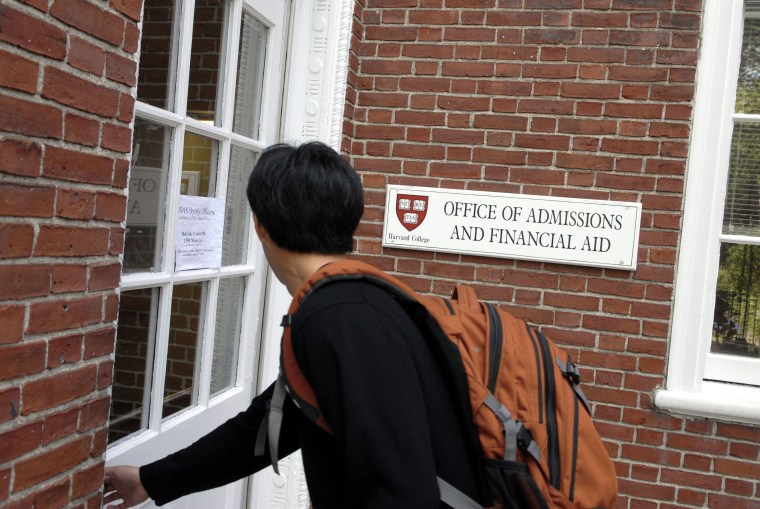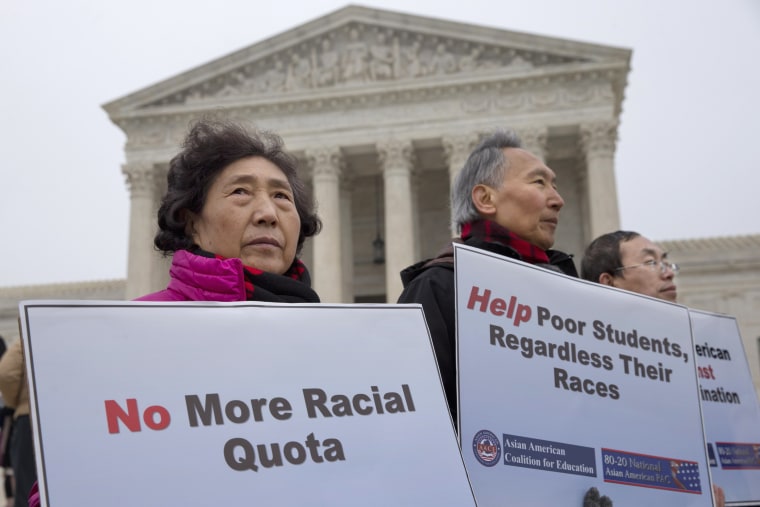A hearing is scheduled in Boston federal court Tuesday to address in part the extent to which documents from Harvard University should be made public in an ongoing lawsuit that accuses the school of discriminating against Asian-American applicants.
Students for Fair Admissions, Inc., which brought the suit in 2014, argued in a March 30 letter to Judge Allison D. Burroughs that documents related to Harvard’s admissions process, internal reports created by the school and tabulated admissions data are among those that should be publicly disclosed.

The group said some of those documents might be used in a filing for summary judgment — in which a judge decides a case without it going to trial — and that they should not have to first be filed under seal.
“It would be impossible for the public to understand whether Harvard’s admissions system — especially the pivotal internal mechanisms used to sort and advance applicants through the process — is being manipulated if they are prevented from knowing how the system is supposed to work in the first place,” William S. Consovoy, an attorney who represents Students for Fair Admissions, Inc., wrote.
Harvard, in its letter to Burroughs, said briefs and supporting documents should first be filed “provisionally under seal,” after which they can work out what materials can appear on the public record, adding that the school understands “there is a public interest in this case and that the public has certain — though not unfettered — interests in access to judicial materials.”
“Those interests, however, must be balanced against the need to protect individual privacy and confidential and proprietary information about the admissions process,” Felicia H. Ellsworth, an attorney who represents Harvard, wrote.
Students for Fair Admissions, Inc. accuses Harvard of intentionally discriminating against Asian-American applicants by limiting their admissions numbers each year. Their lawsuit alleges that the school balances classes according to race or ethnicity, both of which it says are used as “the defining feature” of applications.
The group, whose members include Asian Americans who have been denied admission to Harvard, asserts that this is a constitutional violation of federal civil rights law because the school accepts federal funds.
The Supreme Court has ruled colleges cannot use racial quotas because they violate the Constitution’s Equal Protection Clause, but may take race into account when making admissions decisions.
Harvard, in a statement, denied discriminating against applicants from any group in its admissions process.
“We will continue to vigorously defend the right of Harvard, and other universities, to seek the educational benefits that come from a class that is diverse on multiple dimensions, from its capacity for academic excellence to its ability to help create a campus community that gives each student the opportunity to learn from peers with a wide variety of academic interests, perspectives, and talents,” the statement reads.
An attorney for Students for Fair Admissions, Inc. did not respond to a request for comment.
Citing millions of dollars in public funding that Harvard receives each year, the Justice Department filed court papers on Friday notifying the judge of its “substantial interest” in the suit and in the public’s access to the summary judgment briefing and materials.
The department wrote that the resolution of issues in the lawsuit may bear on an independent investigation it launched into Harvard’s use of race in admissions, following a 2015 complaint from a coalition of Asian-American groups.
The Justice Department, which declined to comment, added in its court document that it may file a “statement of interest” at the summary judgment phase of the case.
Harvard, however, questioned what it called the Justice Department's "belated interest" in the case, noting that the lawsuit was filed back in 2014, according to a letter dated April 9. The school also said the department's submission was unnecessary because it already has or will have access to the confidential documents and filings in question.
The issue of whether Ivy League and elite schools discriminate against Asian applicants has fueled a contentious debate over affirmative action that has found the Asian-American community front and center.
Some argue that the number of Asian-American students admitted annually to Ivy League schools has not kept pace with an overall increase in the Asian-American population. Others disagree, calling these complaints and lawsuits an attack on affirmative action, which they say promotes diverse learning environments.
In addition to Harvard, Students for Fair Admissions, Inc. has also sued the University of North Carolina at Chapel Hill and the University of Texas at Austin in separate cases, alleging they use discriminatory admissions policies.

The president of Students for Fair Admissions, Inc., Edward Blum , is the one who identified Abigail Fisher, the lead plaintiff in Fisher v. University of Texas.
Fisher, who is white, first sued the University of Texas at Austin in 2008, arguing that its holistic-review process, which considers race along with other factors, put her at a disadvantage to other applicants.
In June 2016, the U.S. Supreme Court voted 4-3 in that case to uphold the school’s affirmative action policy.
Meanwhile, in letters filed with the court ahead of Tuesday’s scheduled hearing, Students for Fair Admissions, Inc. asserted that information about Harvard’s admissions process does not amount to a trade secret. The group said Harvard has already made public all key details of its admissions system.
“There is nothing special about the factors Harvard claims to use in making admissions decisions,” the letter stated. “There is no unique element; no special formula.”
Even if it were a trade secret, the group added, “the public’s interest in disclosure here outweighs Harvard’s interest in confidentiality.”
Harvard argued that certain materials, among them documents and deposition testimony about procedures admissions officers use to evaluate applications, are “highly proprietary to Harvard.”
“Making this voluminous information public...would put Harvard at a severe competitive disadvantage vis-à-vis the other highly selective institutions against which Harvard competes for an overlapping pool of applicants,” the letter stated.
Harvard also raised privacy concerns about publicizing application details of hundreds of thousands of high school students. While the school redacted names and information that would directly identify applicants, other data were kept such as where students lived or what awards they received.
“Such information can easily be used to locate and identify a student through a simple internet search,” the school wrote.
Students for Fair Admissions, Inc. said in a follow-up letter to the court last week that it would work with Harvard ahead of filing to make sure no applicant or student is identified.
Burroughs, the judge, is considering scheduling a four-week trial to begin in early January 2019, according to the electronic court docket. Attorneys for both sides could also address the trial schedule at Tuesday’s hearing.
Follow NBC Asian America on Facebook, Twitter, Instagram and Tumblr.

